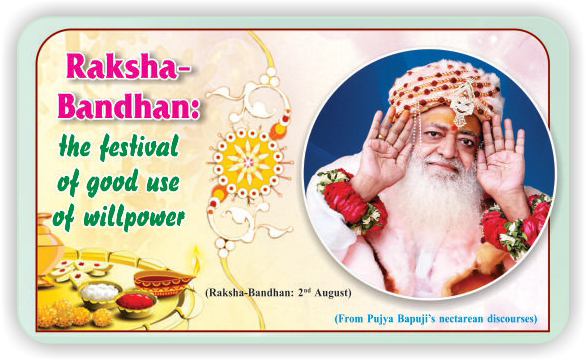Raksha-Bandhan: the festival of good use of willpower

Our Indian culture stands on the foundation of self-sacrifice and selfless service. And it is adorned with a garland of festivals. One of them is the festival of Raksha-Bandhan that comes after Guru-Purnima.
Ordinarily, Raksha-Bandhan is considered to be a festival of brother and sister. It is a festival of promising to maintain the thread of love between brother and sister. It is a festival to overcome our passions. It is a festival when brothers pledge to protect their sisters. But in a broader sense, it is a festival of making noble resolves; it is a festival of being in the vicinity of God; it is a day to offer obeisance to Rishis. Brothers protect our worldly wealth. But saints and Gurus protect our spiritual treasure. First class sadhakas do not make anyone their Guru being impressed by his miracles but they make one Guru whose presence gives the experience of peace and bliss of inner Self. A Sadhaka needs to be under protection of his Guru to save his spiritual treasure from the robbers – desire, anger, greed, etc. The festival of Raksha-Bandhan reminds us of that protection.
Lokamanya Tilakji used to say, “The festivals in our culture are celebrations that save the society from falling into the abyss of despondency, and bathe us in the ocean of love, cheerfulness, and bliss. O people of India! Our Rishis have introduced the tradition of festivals in order to enrich our life with enthusiasm, bliss, love, purity and courage befitting our culture. Therefore celebrate them cheerfully with zeal, and make your life blessed with attainment of God-realization following the guidance provided by the great Rishis of Indian culture.”
Tilakji is right in when he says that there is no possibility of having order, peace and happiness in the nation if it does not have the basis of Dharma and culture.”
Once, Lokamanya Tilakji was on a foreign tour. Suddenly he came to know that it was the day of Raksha-Bandhan. He was, at first, a little sad and anxious that he was away from his sister, but he soon found out a solution. He found an Indian family living in that place. He went to see that family, and said to the lady of the house, “Sister! Today is the festival of Raksha-Bandhan. Be my sister. Tie a thread round my wrist to express your good wishes that I may always have a good moral character and be full of enthusiasm and love.”
The lady was highly pleased at his proposal. She said, “O brother! This sister of yours is truly blessed to have a brother like you.”
She brought a thread and tied it round Tilakji’s wrist with all affection. And Tilakji, overwhelmed with her affection, could not leave his sister’s house without taking a meal.
Whether the Rakhi is expensive or cheap is not important. The benefit and protection received by the brother and sister depends upon selfless love, pure feelings, and pious wishes of the sister. The good wishes of protection that go with the tying of the thread definitely bear fruit. They protect; that may be why it is called Raksha-Bandhan. (Raksha means protection).
The Rakhi thread may be worth less than a rupee. But the wishes and the power of will that goes with it make the heart pure and splendid.
When defeats made Indra, the king of gods, lustreless, his consort Shachi infused new life into him by tying a thread around Indra’s wrist. She said, “So long as this thread tied by me will remain on your wrist, you will be protected from all harm, and you will attain victory too.”
Indra developed life force through the rakhi tied by Shachi, and he gained victory over demons. Rakhi is just a slender thread but the power of good wishes in the heart of the one who ties it, and the faith of the one who gets it tied work wonders.
Kunti, the mother of Pandavas, tied a Rakhi on Abhimanyu’s wrist. So long as the thread was intact, he went on fighting valiantly in the battle of Mahabharata. Abhimanyu was killed after the thread was cut off. The will of Kunti was protecting Abhimanyu to make him victorious. Neither Kunti nor Shachi has tied a thread around your wrists because the gross physical act is less significant in the subtle world. Here, subtle will is sufficient to protect each other. Those who think themselves to be the body need a thread. But for those who think themselves to be Atman, Guru Tattva or Brahman the thread is insignificant. Their resolves are powerful enough to protect one another. The Rakhi thread is thin, but it reminds one of his duty. It is symbolic of mutual empathy.
The sister while tying Rakhi thread around brother’s wrist should wish him that he may not yield to emotions and passions over trivial matters; that he may remain even-minded in all circumstances; that this slender thread may awaken perfect understanding in him. The brother on his part should take a pledge to eradicate all practical, social and mental problems from his sister’s life. This is how the pious festival of Raksha-Bandhan should be celebrated.









